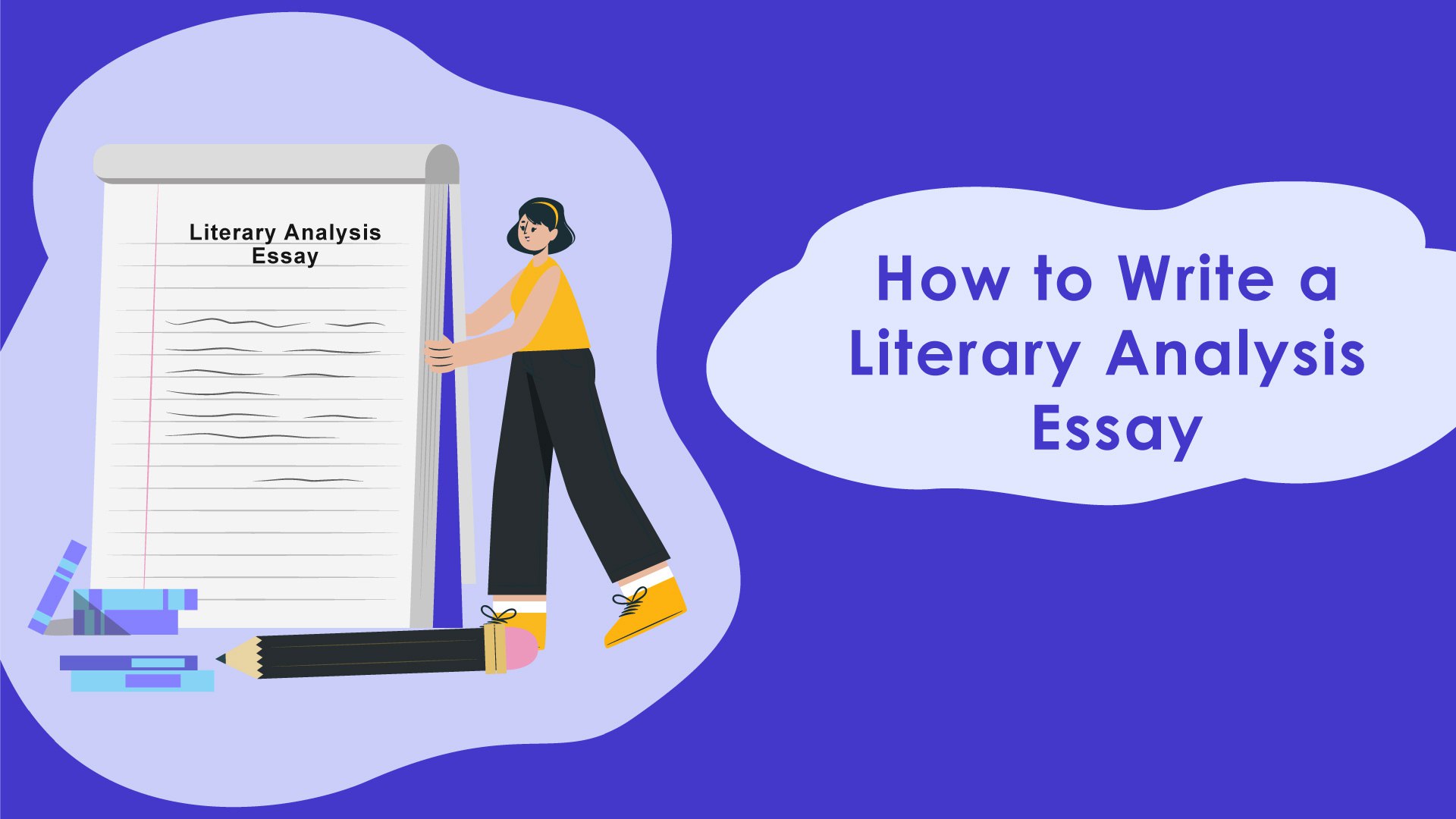Reading a good novel or an engaging play as entertainment is one thing, but reading something for analytical essay writing is quite another. Besides reading the piece, you should research an author, understand the historical context, and read different summaries. Imagine you’ve done all the abovementioned steps. What’s left? How to write a literary analysis? What are the best writing tips for your essay, and finally, what does AI have to do with it?
To help you understand literary analysis writing, this article will answer all these questions. Besides, you will see, in practice, how important AI can be in the process of essay writing.
What is a Literary Analysis Essay
A literary analysis essay is an academic writing about a literature piece, such as a play, novel, or story. The analysis should not be only about the plot but also about writing style, character development, imagery, and much more. The purpose of this type of essay is to understand the piece of literature better and interpret it. To learn how to write a literary analysis essay, let’s first understand its structure. These essays have three main structural elements:
Introduction
As with any other type of essay, literary analysis essays should have engaging introduction parts. An effective introduction is important for capturing the reader's attention. Also it should give context about the literary work. What should the introduction part include? Information about the author, the period the work was created, and the central argument. The reader should understand the purpose of your essay, starting from the introduction.
Body Paragraphs
In the body paragraphs, the writer should talk about the main arguments by analyzing specific elements.
Each body paragraph should adhere to a structured format:
Topic Sentence – This is the main idea of the paragraph. It should support the thesis of your essay.
Evidence from the Text – This component should include quotes or examples to state the argument.
Analysis and Explanation – This shows how the evidence supports the argument and reveals the deeper meaning of the text.
Transition – This connects the paragraph to the next point smoothly.
Example: When writing an essay on George Orwell’s 1984, a body paragraph might explore the concept of "Big Brother" as a representation of government control. The paragraph should show this idea through certain quotes. After mentioning the quotes, they should be explained to emphasize the main argument.
Conclusion
The conclusion of the literary analysis essay is as important as the introduction parts. It shouldn’t just repeat the introduction. Instead, it should synthesize the analysis and emphasize the significance of the interpretation.
Here are some components of a good conclusion for your literary analysis:
Restating the Thesis – Restating the main argument based on the insights from the analysis.
Summary of Key Points – A short summary of the main ideas discussed in the essay.
Final Thought or Broader Connection – Offering a statement to a larger theme. This should make readers think after reading the essay. It can have a connection to real-world issues or contribute to the literature as a whole.
This final and important step leaves the reader with an understanding of the piece of literature and its significance.
Tips To Write An Excellent Literary Analysis Essay
To write an effective literary analysis essay, one has to conduct preparatory work, engage in thinking, and follow a particular sequence of steps. Employing a proper tactic enables a writer to formulate a well-organized essay with a sophisticated argument and scrutiny of the piece of literature in question.
Getting Familiar with the Text and Topic Selection
The first task that must be accomplished in writing a literary analysis essay is reading the text of the base document. Thus, if it is a poem, a short story, a novel, or a play, make sure you understand the basic message the writer is trying to convey and the means he uses to achieve that. In the case of shorter pieces, consider going through them multiple times to grasp their real meaning. For longer pieces, you should read and, while doing so, underline important sections, which will assist you in focusing on the important ones when analyzing later.
Once you finish the text, consider some important questions: What stands out? Which themes, characters, and symbols are present in and about the work? What is the gap in knowledge which the writer seems to possess? What role is the significance of the characters’ motivations to the story? What part does the setting play as far as the story is concerned? You will find these questions useful.
Having finished reading the text, analyze and reflect on what stands out. Focus on the plot and attempt to answer how the core characters represent the title’s thematic fish. Consider the following: What do you think the author is trying to communicate? What impact do the characters’ aims create on the plot? Analyze the motivations of the supporting characters and assist yourself in determining your viewpoint.
2. Collecting Necessary Materials and Formulating the Main Argument
After coming up with a topic, extract evidence from the text to support your analysis. Search for quotes, symbols, and passages that summarize important ideas. The proof that you collect must pertain to the thesis that has an argument concerning the work. An analysis of a given text will be more engaging if accompanied by a strong thesis statement that captures the reader’s attention rather than providing them with mere facts or summaries.
For instance, you may consider the author's perspective about a particular theme or symbol and how it relates to the author's attitude about a specific issue. This thesis will surely guide your entire essay; thus, make sure it is precise and should be defended as you start accumulating evidence. These gaps and complexities will often serve to deepen the analysis.
3. Drafting and Arranging the Argument
You can create a structure now that you have a thesis and supporting evidence. Each body paragraph should focus on a single point in your argument. Start each paragraph with a topic sentence that encapsulates the main idea. Then, quote the text, followed by an interpretation of how it supports your claim.
At this stage, create your first draft. Don’t worry about length or perfection. Just pour your thoughts out onto the paper. Some of your ideas may need deeper explanations, while your hypothesis may require an overall change. The drafting stage is an opportunity for you to go deeper with the ideas you have and ensure that they are correctly articulated.
4. Using AI Tools for Essay Writing
After working on the rough skeleton of your draft, it is time to put it all together. You can now benefit from AI tools such as grammar checkers or writing assistants that help you look at the big picture by identifying faulty sentence structures, unnatural phrasing, or illogical flows of arguments. Automated services can be quite helpful in perfecting the essence of the language. However, they must not replace the reasoning that is achieved through thinking and analyzing the argument.
In conjunction with AI tools, take the time to revise the document thoroughly yourself. This means reading through the essay and identifying ill-defined and repetitive phrases or structures. Check that your argument is watertight with the evidence that you have provided and that each paragraph contributes to your central thesis. Provide clear, succinct, and coherent statements because this is the final stage where your essay should be the most interesting.
5. Finalizing Your Work and Seeking Feedback
The last step is to recheck your essay. You might consider letting someone read your essay and provide constructive criticism. A different person’s perspective could reveal mistakes that you would not have noticed. The second perspective can also provide further suggestions to enhance your essay. Look out for problems regarding the structural components of the essay. Also, don’t forget about other essential aspects, such as grammar and punctuation.
After making the necessary changes, ensure your essay has logically dealt with your thesis. By making sure there is enough preparation, organizing structure, and adequate revision, you will be capable of submitting an insightful, polished literary analysis essay.
Mistakes that Can Ruin the Best Literary Analysis Essay
High school and college students tend to make mistakes while writing literary analysis essays. By knowing the common mistakes, it will be easier to avoid them. So, let’s take a great novel by Kurt Vonnegut as an example. “Cat’s Cradle” will be used to illustrate these mistakes and make the writing process smooth and easy.
1. Not Reading the Literature Fully
One of the most frequent errors is not reading the literary work fully. Sometimes, students do not manage to read the literature list fully and rely on short summaries. This way, the essays become incomplete and inaccurate.
Example: If you only read reviews of the novel, you might miss the significance of Bokononism and its impact on the characters' beliefs. Missing this kind of key element would make the fact of not reading the book evident for essay readers.
2. Writing a Summary Instead of an Analysis
Everyone can google and read the plot of the book. It’s not what your purpose should be. If you don’t want your essay to become basic and not original, focus on questions. Analyze any question that appears during the reading. That’s why your work is called “analysis”.
Example: Instead of just writing about how a journalist is trying to write a book about a scientist, analyze how and why Vonnegut criticizes the dangers of modern science. Talk about what kind of techniques he uses and how important satire is in this novel.
3. Poor Organization and Structure
A well-organized essay feels to have better arguments. Do not confuse readers with your random thoughts and sentences. Otherwise, even if you have read and analyzed the whole poem or a novel, it’s not going to work. Each paragraph should be focused on a certain topic and start with an engaging sentence. All sentences in a paragraph and all separate sentences should connect logically within the essay.
4. Rushing the Editing Process
Always check what you have written. Many students think that submitting earlier is good. But it doesn’t work with the writing tasks. This way, you can have weak flow and grammatical and stylistic errors. If you have time, don’t rush. Recheck and read the essay out loud even if you have already checked everything.
By knowing about these common mistakes, you can easily avoid them. Because the real sharp people learn from the mistakes of others.
How to Write a Literary Analysis Essay Using GetCopy AI
GetCopy AI is a great option if you’re looking for a tool to write literary analysis essays. This tool can be helpful for students and writers to create great structures and generate content for the analysis. Definitely, you have to use your own knowledge and writing skills to get the best out of this tool. Here is how you can do that.
Provide Key Information
Enter your GetCopy account and click on “New Document.” Select the “Wizard Document” and then “Essay” as your content type. As you can see, there are dozens of more options like “Literature review”, “Research Paper,” and “Blog Post.”
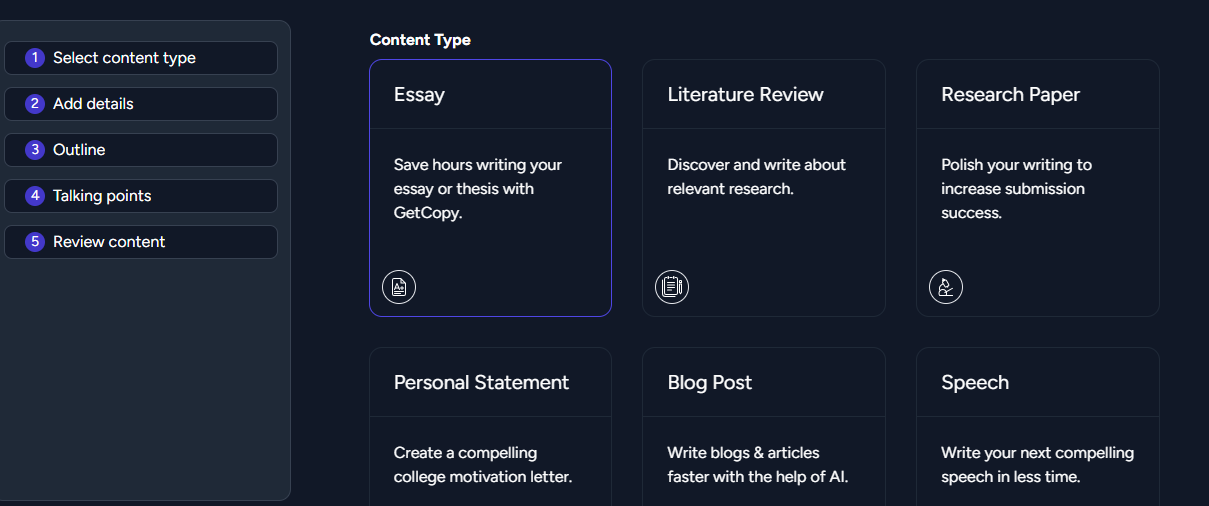
After that, you have to fill out the document details. We will name the document “A Literary Analysis of "Cat's Cradle" by Kurt Vonnegut.” In the content specifications field, fill in the information that will be helpful. For example, in this case, we can use keywords like “satire,” “science and religion,” or “absurdism” to help the AI generate a strong foundation for our essay. Add audience details and after, select the tone of voice. Here is how it should look:
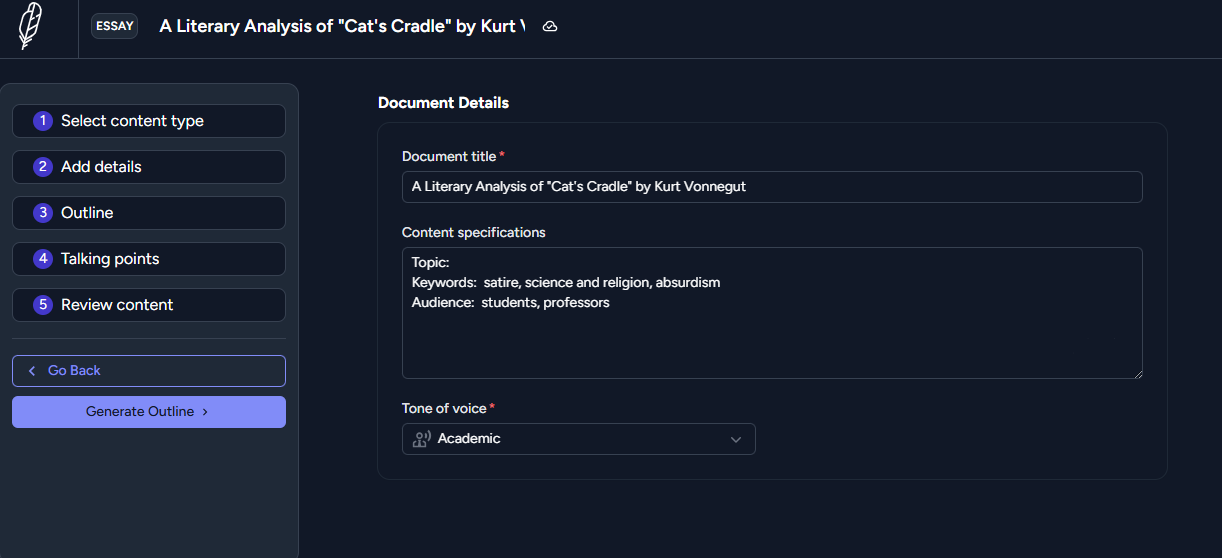
2. Generate an Introduction, Outline, and Key Sections
Click on “Generate outline,” and after step by step, generate other information like introduction and conclusion. You will get the foundation of your essay. In each section, you will be able to regenerate and add talking points.
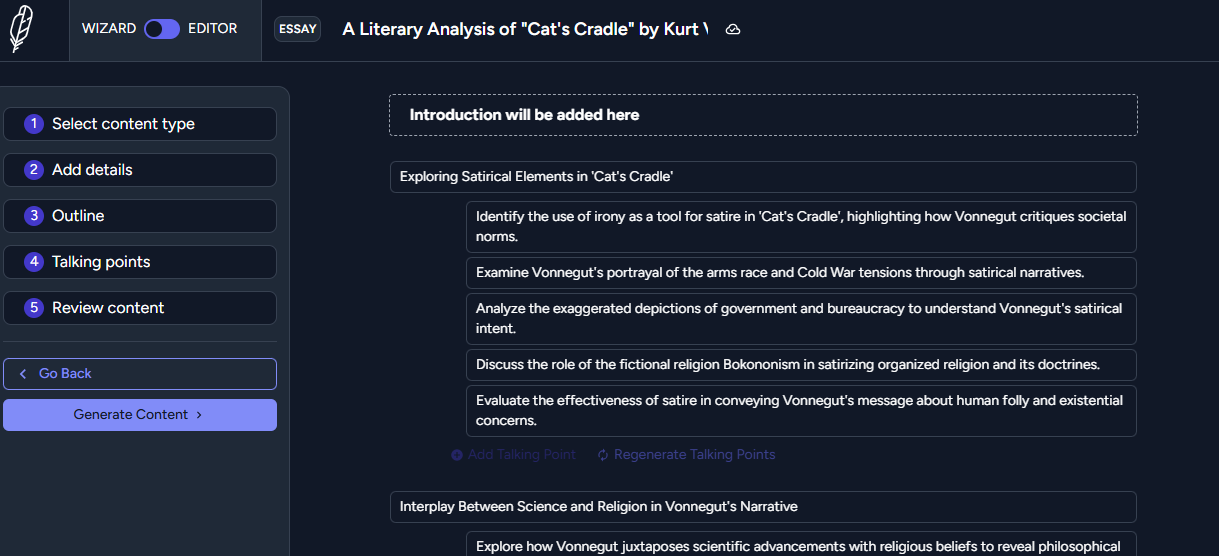
After your edits, you can generate your final content with one simple click.
3. Edit and Save The Document
At this point, all you have to do is edit your document as needed and save it. You can add your thoughts and perspectives and change the flow to make it look more human.
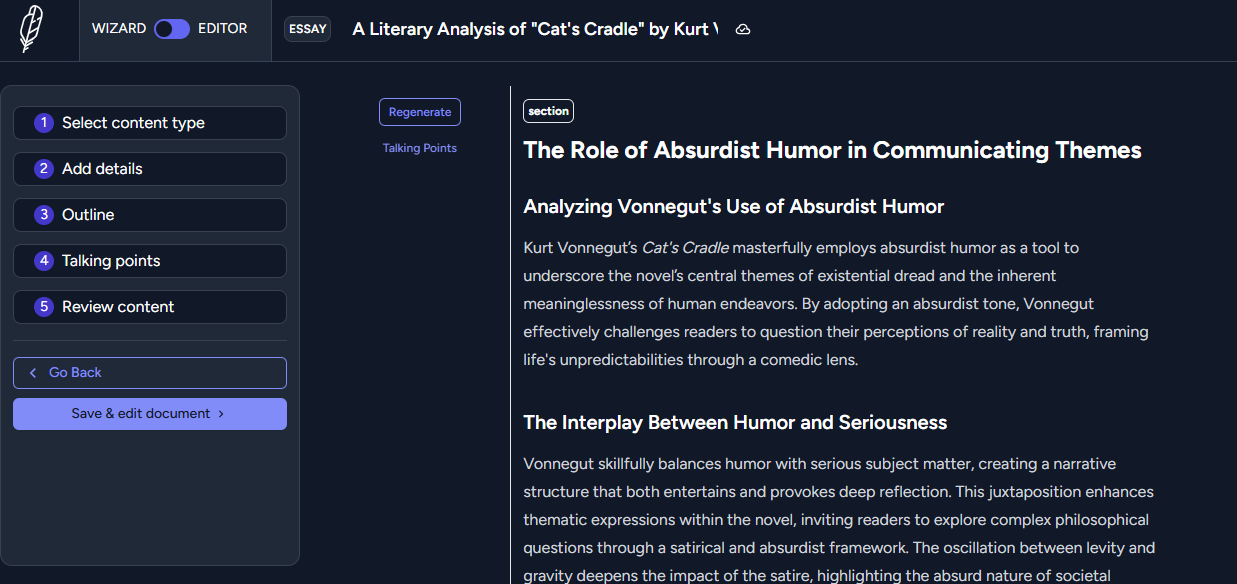
You can add depth, include quotes from the novel, and improve it with a human touch. After all of your editing, you can export an essay as a Word or PDF file. Besides, you can create a link, and ensure easy access to your essay.
FAQs
What is the purpose of a literary analysis essay?
A literary analysis essay is not a summary or a review of literature work. Its main purpose is to examine various elements of the text (such as character development, theme, or symbolism). The analysis is conducted to understand the novel or a play more deeply and give one’s interpretations. So, while writing the literary analysis essay, you should connect it with different contexts and understand the author's central message.
What should be included in the introduction of a literary analysis essay?
The introduction of a literary analysis essay should start by introducing the title of the work and the author. It should tell the historical background of the piece, the main themes, and information that will be necessary to understand the text. You don’t have to add extra details if they don’t form the complete understanding of the piece. The introduction should also contain every component of other traditional essays (such as the thesis and main arguments).
Can I add my personal opinion to my essay?
It’s important to add your unique perspectives to the essay. But there is one crucial thing to remember. The personal opinion must be connected to logical reasoning. If you just feel like the main character is not developing through the novel, you can’t add that to the analysis. You should find evidence in the text and only then talk about it.
How do I write a good analysis instead of simply summarizing the book
The main difference between analysis and summary is the focus. While writing the literary analysis, you should talk about “why.” Try to understand why the character did this or that, why the author used certain symbols, and so on. This way, you will understand the motivations of different characters and the whole work deeply.
How can AI tools like GetCopy help write literary analysis essays?
AI tools can be beneficial during literary analysis writing. These tools can help you brainstorm ideas, generate outlines, and improve your arguments. GetCopy is an ultimate tool that is perfect for essay writing. However, you should understand that every AI-generated copy needs a human touch and a human perspective. So, after generating anything with AI tools, you have to add your insights and ideas and recheck everything.
How can I make my analysis more original and insightful?
To make a literary analysis essay more original, you have to add an original and fresh perspective. To ensure your analysis is distinctive, try to examine the text from a fresh perspective. Instead of leaning on conventional interpretations, think about how the themes, characters, or symbols in the text relate to current issues, philosophical concepts, or other literary works. In Cat’s Cradle, you might examine how the absurdity of the story highlights the risks of blindly following ideologies or how Vonnegut’s satire questions traditional views on religion and science. Incorporating these analytical layers will enrich your essay and enhance its originality.

